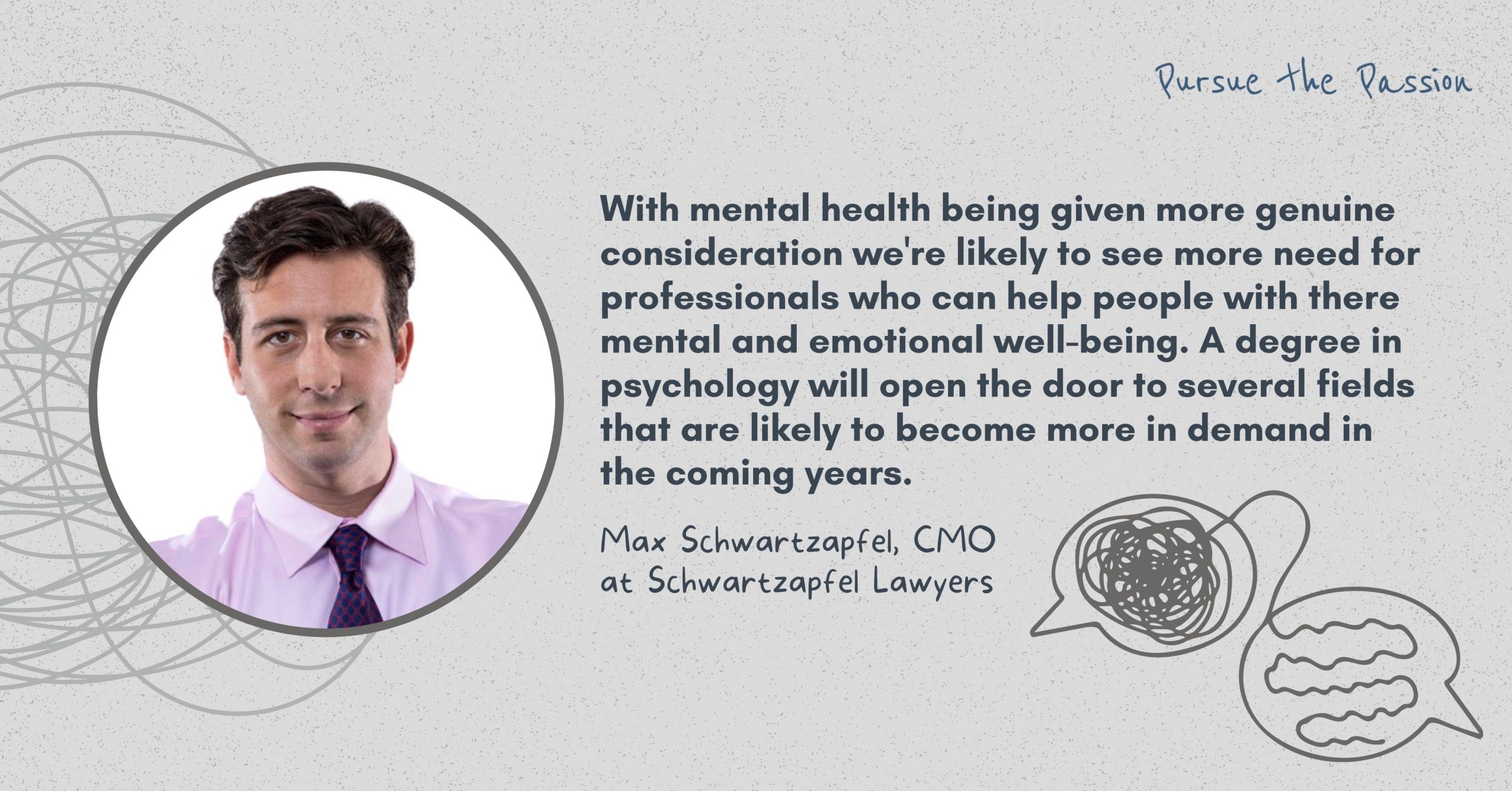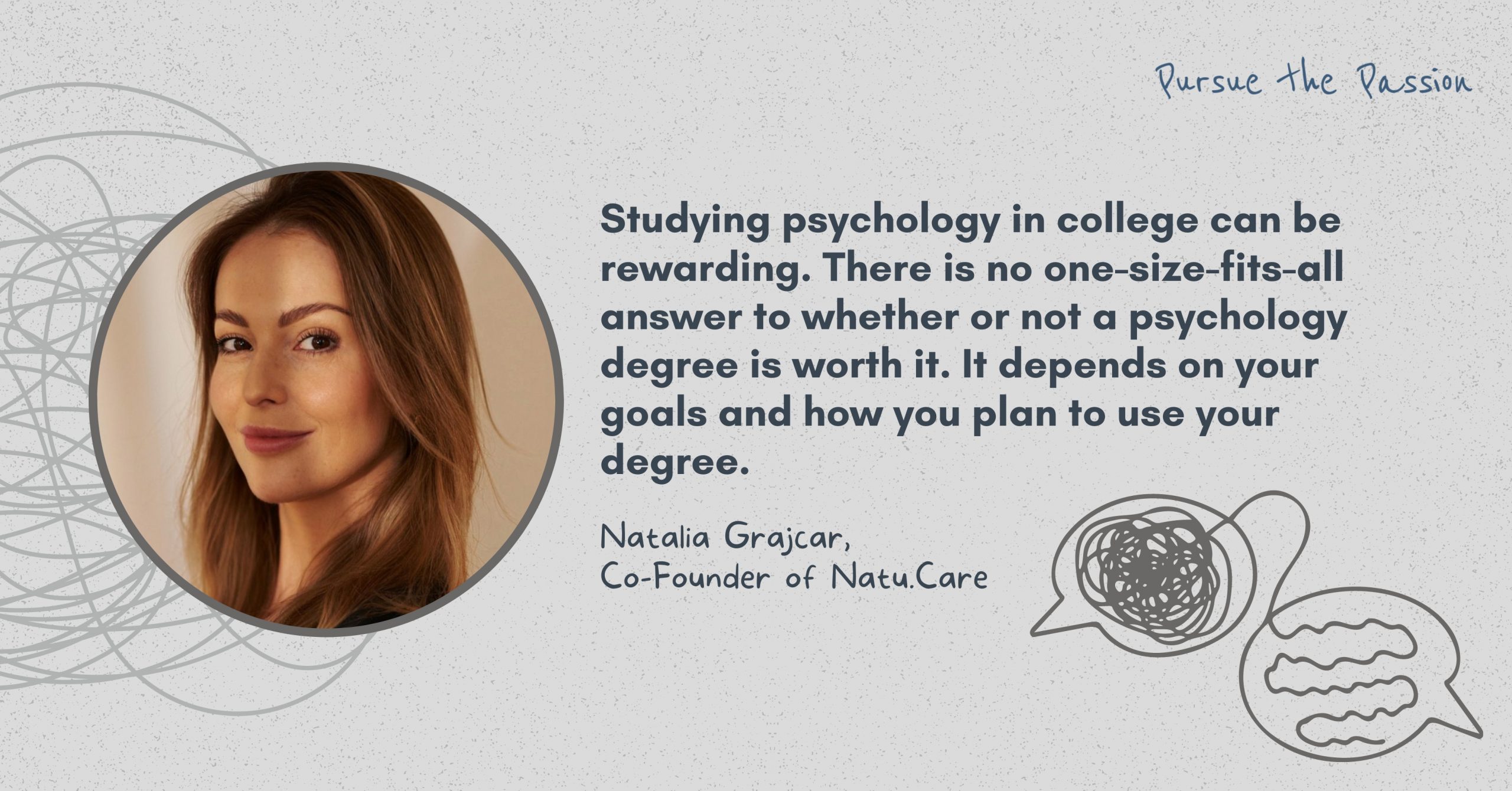Is a degree in psychology worth it?
Here are answers from industry experts and professionals with their answers to the question, “Is a degree in Psychology worth it?”
- The Push for Understanding Mental Health Stays on Trend
- Gives You Basic knowledge on How Others Think
- Offers A Wide Range of Opportunities
- Appreciation of Human Behavior and Enhanced Research Skills
- Find Your Inner Purpose Before You Commit
- Start With a Psych Degree if You Have Plans for a License
- Gives You Precious Insights Into Yourself
The Push for Understanding Mental Health Stays on Trend
There has been a large push for a greater understanding of mental health and how it affects workplace performance. With that comes a need for understanding the mind in all aspects of life, not just while your on the job.
With mental health being given more genuine consideration we’re likely to see more need for professionals who can help people with there mental and emotional well-being. A degree in psychology will open the door to several fields that are likely to become more in demand in the coming years.
If you have an interest in understanding the human mind and an inclination for helping others then the field of psychotherapy might be a great fit for you. A degree in Psychology can open up this path for you.
Max Schwartzapfel, CMO, Schwartzapfel Lawyers

Gives You Basic Knowledge on How Others Think
A degree in psychology does more than make a clear career path towards clinical psychology, therapy, psychiatry, etc. On a more basic level, a psychology degree gives you a background knowledge of knowing how people think, function and operate, which can be hugely helpful for an array of job opportunities.
Even if your end goal is not to open your own medical practice, the good news is this degree can open many other doors — sales, marketing, customer service — and won’t limit you to one industry.
Bradley Hall, Co-Founder & CEO, Sonu Sleep
Offers A Wide Range of Opportunities
As an experienced clinical psychologist and founder of a health and wellness center, I can confidently say this to anyone pursuing a degree in psychology — few other fields offer you as wide a range of opportunities. With a degree in hand, you can explore just about every industry and segment, and here’s a brief peek into only a handful. As a student of psychology (more notches in education and experience will propel growth), you can explore various niches in the field. You can help individuals, families, special groups, and professionals deal with their psychological challenges. As a social worker, you can dive deeper and commit yourself to causes impacting society, or explore counseling and see your advice influencing lives. From education, science, and research, to business, HR, and media and communications, every industry holds promise. Study further, gain a master’s or doctorate, enroll in a postdoctoral program, or apply for a professional license — the sky is the limit.
Azmaira Maker, Ph.D., Founding Director, Aspiring Families
Appreciation of Human Behavior and Enhanced Research Skills
A degree in psychology can lead to a range of career opportunities. The skills learned in understanding how to research, and synthesize combined with deep mathematical/statistical expertise have wide applications. But it is arguably the appreciation of human behavior that has the widest value.
In the digital industry I work in, we hire psychology graduates because they make excellent design researchers. Researching, analyzing and understanding human behaviors in support of product and service design is the foundation of a customer-centric strategy. The skills they acquire during their degree make the transition into the workplace straightforward.
Psychology degrees also include a high level of statistical analysis. Graduates are often very good at quantitative research and the data analysis that follows. That can lead them not only into a design research career but also market research.
Paul Blunden, Founder & CEO, UX247 Ltd
Find Your Inner Purpose Before You Commit
Studying psychology in college can be rewarding. There is no one-size-fits-all answer to whether or not a psychology degree is worth it. It depends on your goals and how you plan to use your degree. To become a psychologist, you will need to earn a doctoral degree in psychology. This can be a long and expensive process, and it may be challenging to find a job once you graduate. However, if you are passionate about psychology and want to help people, this career may be right for you.
If you are interested in psychology but don’t want to become a psychologist, there are many other options available with this degree. You could work as a social worker, counselor, or therapist or use your knowledge to pursue a career in marketing, advertising, or human resources.
Ultimately, the decision of whether to get a psychology degree is up to you. But if you do decide to go for it, be sure to do your research and choose a program that fits your goals and interests.
Natalia Grajcar, Co-Founder, Natu.Care

Start With a Psych Degree if You Have Plans for a License
A degree in psychology is worth a student’s time and money if they plan to continue their education and become a licensed Psychologist. Having the foundational bachelor’s degree will help with coursework and exams in a master’s program. However, if the student doesn’t care to become a certified professional in psychology — and practice in a clinical or academic setting — a bachelor’s degree in the field may not be the best option. Most jobs required an advanced degree.
Kelli Anderson, Career Coach, Resume Seed
Gives You Precious Insights Into Yourself
Absolutely, yes! There are many great reasons to get a degree in psychology. Studying psychology deepens your understanding of various factors that affect human behavior. Thanks to that fact, you gain a universal set of precious people skills, which are always in demand in the workplace and beyond. Effective communication, empathy, and the ability to influence others are valued in all industries. A psychology degree opens up a huge range and variety of career opportunities.What’s also crucial, students can tailor their education to focus on areas appealing to their interests and potential future jobs. There are a number of specializations to choose from. They include human factors psychology, clinical psychology, health psychology, and more.Last but not least. Psychological knowledge gives you precious insights into yourself, which facilitates your personal growth. A degree in psychology is definitely worth it, as you can see.
Agata Szczepanek, Community Manager, LiveCareer
Submit Your Answer
Would you like to submit an alternate answer to the question, Is a degree in psychology worth it? Why or why not?






